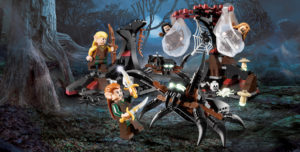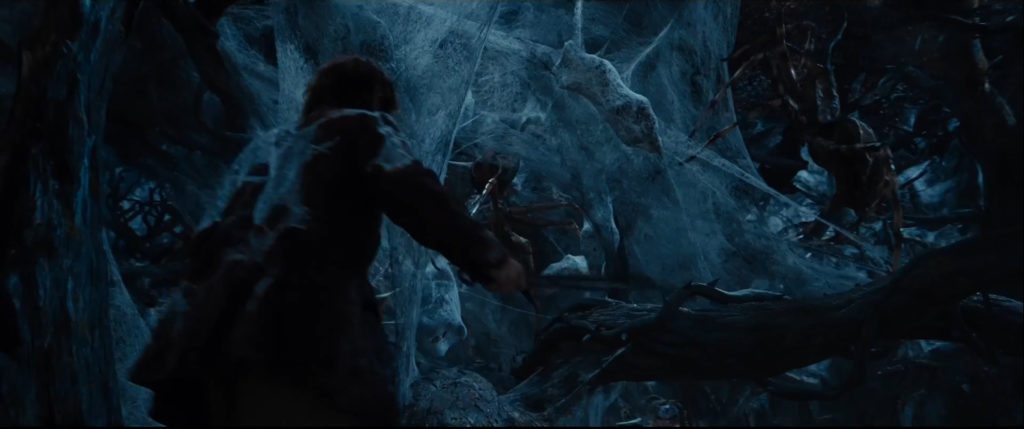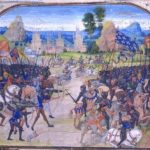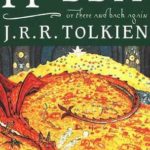‘The Hobbit’ Story Group 8: Flies and Spiders
By now the “haunted forest” setting seems cliché in fantasy and even contemporary stories. Yet it was already a well-known fairy-tale trope by the time Tolkien used it, and in my view the fantasy master does well preserving this theme yet taking it into an original direction.

Remember in the book when Legolas and “Tauriel” fought the spiders? (This prematurely made and marketed Lego playset was released last year.)
Viewers of The Hobbit: An Unexpected Journey last year know that this new trilogy-starter showed one of Middle-earth’s dark forests, Mirkwood, earlier than expected. At least we caught sights of it outside the tree-cabin of forest-wizard Radagast the Brown — an addition to The Hobbit book but not to the whole story as Tolkien later added to it.
Similarly, the film will likely explore more about how Mirkwood came to be corrupt. Like all of Middle-earth, that place was not originally bad. But wicked corruption from a dark mysterious source will form a mystery in the film version (hint: Sauron’s behind it all).
The idea of an “evil place” or a corrupted geographic locale is common in stories. But this idea brings with it some baggage that many Christians often apply to fantasy stories as a genre, as well as many other “corrupted” places or objects. We tend to treat these things as “infected” by evil, rather as objects that have become corrupt because of outside human influence. By contrast, how does Scripture address the nature of evil corruption? How does it start? How does it end? How does sin affect things in the world, including places, and how does Christ’s redemption of human beings in turn begin to redeem the world (Rom. 8)?
Chapter 8: Flies and Spiders
- Read chapter 8, pages 131 (they walked in single file) to 133 (uncanny darkness).
- Why do so many stories include the idea of a “dark forest” or “dark place,” where a very land or tree can be evil? (Examples: Snow White, Hansel and Gretel, Pilgrim’s Progress.)
- Biblically and in reality, can a place originate evil? If not, how do we see it? (Romans 8.)
- What may have gone wrong with Mirkwood to make its waters so darkly enchanted and its creatures so foul? What bad “human” influence drew the evils? (Hint: Necromancer.)
- To you, what could seem creepy about a stream of water that puts you to sleep for days?
- Read chapter 8, pages 143 (The smell of the roast meats) to the chapter’s end.
- Unlike the friendlier (yet jolly and teasing) Rivendell Elves, why do the Mirkwood Elves vanish like that, along with their light and their entire party, three times?
 Giant spiders? Discuss. Giant spiders who poison people to devour? Discuss further.
Giant spiders? Discuss. Giant spiders who poison people to devour? Discuss further.- This time there is no Gandalf to save the Dwarves in their sorry state. There is only Bilbo. What are the differences between the two problem solutions? If we were to allegorize this, we could think that it’s endorsing man-centeredness — wizards and magical heroes can’t help us; we need to save ourselves by quick wit and thinking. Is that what you get out of Bilbo’s acts of heroism here? Why does Bilbo act more heroically?
- Do you think Bilbo’s singing mockery of the spiders make the scene less grotesque?
- Some of them even got up and bowed right to the ground before him, though they fell over with the effort. … Knowing the truth about the vanishing did not lessen their opinion of Bilbo at all; for they saw that he had some wits, as well as luck and a magic ring — and all three are useful possessions. In fact they praised him so much that Bilbo began to feel there really was something of a bold adventurer about himself after all, though he would have felt a lot bolder still, if there had been anything to eat. (page 156) What are the risks of Bilbo thinking this about himself? What are the advantages? What would you think if you were a Dwarf, finding out that Bilbo had done most of this with a magic ring’s help?
- Why do the Elves, if they are Good People (page 157), take the good Dwarves hostage?











































The discussion of the Wood Elves becomes more interesting if one knows all the things the Noldor did in the Silmarillion. Three Kinstrifes, general infighting, imprisoning Luthien, etc… Elves are not safe, nor are they “good” in the traditional sense of the world. The Wood-Elves here are not Noldor, but SIndar, the grey-Elves and descendants of those who never journeyed to Valinor. They live in a more dangerous environment and have a bad history with strangers–even their own kin, so it makes sense they’d be really suspicious.
That is why we simply can’t think of the Elves as enemies in the traditional sense, and Tolkien never, ever lets the reader get that far. One of the victories of The Hobbit: An Unexpected Journey, as with The Lord of the Rings, is that the story rarely lets the Elves be “safe.” Here’s hoping The Desolation of Smaug preserves this perspective. However, adding Legolas (who could have been at the book’s Mirkwood, but isn’t in the book) and a new character could lead viewers to over-identify with a group who, in the book, is a more-distant group of incidental antagonists.
Well, the whole Mirror of Galadriel scene helped with that in FOTR, thought the Hobbit seems to set Thranduil as “arrogant snob” than “concerned monarch…”
The easy answer for dark, evil forests is that mankind has lived next to dark forests for a long, long time and is well aware of how dangerous they are. Though it seems to me to be projection and personification to label a collection of trees “evil.” (Don’t see what bearing Romans 8 has on this.)
Then again, one shouldn’t ignore symbolism. It’s been too long since I last cracked open The Hobbit (not my favorite of the LOTR collection, but who knows, it might grow on me if I read it again), but one possibility is that Mirkwood represents fear, uncertainty, etc, especially since they are lacking Gandalf. Or it could represent the essence of evil: threatening, predatory, etc. Or it could be both. Or something that might not occur to me until 4 hours after posting this. Symbolism: Your Mileage May Vary.
Romans 8 is relevant because in this passage, the apostle Paul (inspired by the Holy Spirit) says that “the creation itself” groans in pain, not because it is evil but because sinful man subjected it to futility. Paul goes on explicitly to say creation is awaiting redemption and resurrection, just as God’s people await final resurrection. When I read about “evil places” in most fantasy, I recall that even in those worlds, the places are not intrinsically evil. They’ve only been subjected.